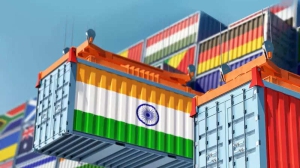Fast-paced technological changes have forced industries to streamline and organise the underdeveloped logistic industry making it an attractive option today, says Sandeep Sharma
Moving in the direction to fulfill its promise of creating a healthy and well-educated workforce. From giving relaxation to small businesses in logistics sector to file GST once in three months to allocating Rs 64,587 crores for improvement of rail transport, the Government is working in favour of the industry. This is to support the ease of doing business in India, alongside creating job opportunities for youths, in which logistics industry is important.
The ongoing significant public and private investments in the transport and warehousing facilities have opened ways for MSMEs to reduce the overhead expenses and focus on improving the supply chain efficiency. Rightly pointed out in Teamlease’s report Indian Logistics Revolution-Big Bets, Big Jobs, public investments and steady evolution of the sector, spurred by snowballing demands, will continue to drive the growth of Rs 14,19,000 crore logistics sector at CAGR of 10.5%. The major impact can be seen in road freight, rail freight, air freight, warehousing, packaging, and courier services and the creation of nearly 3 million new jobs is anticipated. With this, employment numbers in the logistics sector may increase up to 13.9 million by 2022, which are 10.9 presently.
The Evolving Industry
Logistics is backbone of the nation’s economy but used to be considered low-skilled industry earlier. Therefore it remained the last career choice for many. The consequences of which were the lack of well-trained talent and innovation. The business had to face endless struggles to source and retain the right talent for the right job. Thanks to the latest digital technologies and MSMEs who have joined the forces to streamline and organise the underdeveloped industry that logistics has today become an attractive career path.
The outdated pen and paper processes for documentation are replaced by new modes like E-way bills, the traditional word-of-mouth promotion and marketing is now supported by digital marketing. The logistics and supply chain has come a long way contributing 13% to India’s GDP. It is slowly getting digitalised spearheading the emergence of new jobs and transformation of the traditional ones.
The New Era
In coming few years, there will be an enormous shift in demand management between transportation modes. New national waterways being built, a plethora of sophisticated 3PL and 4PL players revolutionising the warehousing sub-sector, increasing consumption and consumer maturity is providing a big fillip to the packaging sub-sector, leading to more job creation. As Indian logistics industry is now adopting the digital technologies and harnessing its potential, clearly evident from the digitalisation of export and import transactions and popular use of electronic tagging technology, there is a recurrent demand of skilled talents.
Every business today is in need of well-trained and qualified professionals who can manage their inventory and warehouses, keep tracks of accounts, and handle the customs and regulatory compliance, and other processes depending on the skills availability. The professionals in this sphere continually strive to ensure that goods and services are delivered to consumers on time and in proper condition under minimum costs to achieve the high levels of customer satisfaction. The focus is on providing the best service to customers and increases the supply of goods in the market. For this, the market players require a large number of trained manpower.
Looking at the present employment status, over a lakh of incremental jobs are expected in warehousing alone.
Rise of New Job Roles
The job roles like consignment booking assistant, e-documentation assistant, courier delivery executive, warehouse packer, inventory clerk, logistics and distribution manager, supply chain analyst, supply chain coordinator, supply chain manager are born out of the need to stay attuned to the evolving industry scenario and tech adoption on a large scale. As integrated logistics is the new trend, talents working in the sector bag high compensation packages that vary from skills, experience, and knowledge. In order to retain them and encourage adding value and innovation in the business, companies also ensure the stress-free working conditions and complete safety to achieve higher employee productivity and efficiency.
Re-engineering Skills
With tech-oriented logistics gaining momentum, various universities and private educational institutions offer degree, diploma, and certificate programmes in logistics and management. To get jobs, a bachelor or master degree or any professional diploma course in Logistics and Supply Chain Management that credit them with the essential knowledge and skills of the field or responsibility. Even the Government is keen to equip the youths with the optimal skill-set and empower the existing employees in the logistics and supply chain management sector through the specialised training centres.
The writer is CEO-founder, Cogent Transware Solutions


























